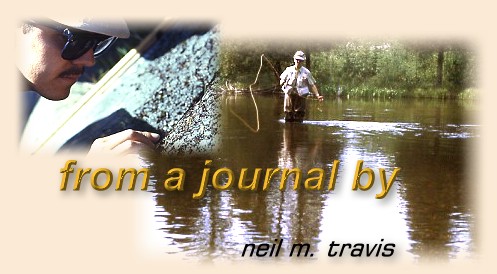I’VE SEEN THE FUTURE
The date: 2050.
The place: somewhere in America.
The scenario: an angler preparing for a fly-fishing trip.
The check-list: reservations
In order to go fishing the angler must first have reservations. All of the water open to angling is under private management. State agencies that once managed the public fisheries turned over those duties to private management firms in the early part of the century due to budget problems. Now all waters that allow angling require the angler to make reservations. A fee, depending upon the quality of the water, is required of each angler. To fish quality waters it is usually necessary to make a reservation a couple years in advance.
*Note: Due to pressure from animal rights groups most water is closed to angling of any type.
License:
In addition to a reservation you must have a license for the water that you are intending to fish. These licenses are still sold by the state agency that formerly managed the waters. License prices are set in accordance with the quality of the water that you will be fishing. Blue-ribbon trout water and trophy bass water licenses are quite expensive. Licenses to fish for most salt water species are strictly limited, and licenses for anadromous species of fresh water fish – salmon and steelhead – are sold by lottery. Anglers must procure a license before they can make a reservation to fish for these fish. Anglers that are successful in securing a license to fish for an anadromous species is prohibited from applying again for five [5] years.
Note: Due to overharvesting and loss of habitat anadromous fishing is very restrictive and there are only a few streams that still have any runs of these fish.
Certificate:
All anglers must have an ‘angling certificate’ which proves that the angler has demonstrated proficiency sufficient to fish the designated type of water. The angler can choose from several types of waters which range from general angling – bait fishing, both warm and cold water, - lure fishing – and fly-fishing. Each type of water requires an angling certificate. Anglers must be able to demonstrate their ability to use the equipment – casting rod, fly rod, etc. – a knowledge of the equipment and lures that are used, and correct technique on playing, landing and releasing the fish. [Most of the angling is catch and release except for those waters reserved for bait fishing] Angling certification programs are provided by the private management firms that handle the reservation system.
Note: Angler certifications are required for all types of angling. Fly fishers wishing to fish for salt water or anadromous species must demonstrate a wide variety of casting skills and proficiency in the use of several types of tackle. Certification for salt water and anadromous species usually require several years to obtain.
Gear:
Due to the spread of various fish diseases by anglers moving from one water to another all fishing gear that comes in contact with the water must be disposable. This includes, but is not limited to, waders, lines and other terminal tackle, including flies and lures. All angling gear that is required to be disposable must be certified as new before a reservation can be secured and must be presented for inspection before the angler can enter the designated water.
General notes:
Once the angler has secured the necessary certifications and purchased the required disposable equipment they may apply for a reservation. To secure a reservation the angler must fill out a reservation request and attach copies of the required documents [certification, disposable equipment receipts] along with fee for the reservation. Due to the demand and the limited amount of available water the angler cannot specify a date. Most reservations take a year to be granted, and for the more restricted types of angling it may take several years before the angler can get a reservation. Maximum angling time on any reservation is 48 hours.
To fish for anadromous fish and most salt water species the angler must secure the services of a professionally licensed outfitter. The angler must secure the services of the outfitter at their own expense.
Due to the tenuous nature of many fish species a reservation may be cancelled at any time. Fees paid, in advance, to secure the necessary license and reservation are not refundable.
